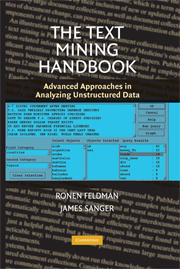Book contents
- Frontmatter
- Contents
- Preface
- I Introduction to Text Mining
- II Core Text Mining Operations
- III Text Mining Preprocessing Techniques
- IV Categorization
- V Clustering
- VI Information Extraction
- VII Probabilistic Models for Information Extraction
- VIII Preprocessing Applications Using Probabilistic and Hybrid Approaches
- IX Presentation-Layer Considerations for Browsing and Query Refinement
- X Visualization Approaches
- XI Link Analysis
- XII Text Mining Applications
- Appendix A DIAL: A Dedicated Information Extraction Language for Text Mining
- Bibliography
- Index
Preface
Published online by Cambridge University Press: 08 August 2009
- Frontmatter
- Contents
- Preface
- I Introduction to Text Mining
- II Core Text Mining Operations
- III Text Mining Preprocessing Techniques
- IV Categorization
- V Clustering
- VI Information Extraction
- VII Probabilistic Models for Information Extraction
- VIII Preprocessing Applications Using Probabilistic and Hybrid Approaches
- IX Presentation-Layer Considerations for Browsing and Query Refinement
- X Visualization Approaches
- XI Link Analysis
- XII Text Mining Applications
- Appendix A DIAL: A Dedicated Information Extraction Language for Text Mining
- Bibliography
- Index
Summary
The information age has made it easy to store large amounts of data. The proliferation of documents available on the Web, on corporate intranets, on news wires, and elsewhere is overwhelming. However, although the amount of data available to us is constantly increasing, our ability to absorb and process this information remains constant. Search engines only exacerbate the problem by making more and more documents available in a matter of a few key strokes.
Text mining is a new and exciting research area that tries to solve the information overload problem by using techniques from data mining, machine learning, natural language processing (NLP), information retrieval (IR), and knowledge management. Text mining involves the preprocessing of document collections (text categorization, information extraction, term extraction), the storage of the intermediate representations, the techniques to analyze these intermediate representations (such as distribution analysis, clustering, trend analysis, and association rules), and visualization of the results.
This book presents a general theory of text mining along with the main techniques behind it. We offer a generalized architecture for text mining and outline the algorithms and data structures typically used by text mining systems.
The book is aimed at the advanced undergraduate students, graduate students, academic researchers, and professional practitioners interested in complete coverage of the text mining field. We have included all the topics critical to people who plan to develop text mining systems or to use them.
Information
- Type
- Chapter
- Information
- The Text Mining HandbookAdvanced Approaches in Analyzing Unstructured Data, pp. x - xiiPublisher: Cambridge University PressPrint publication year: 2006
